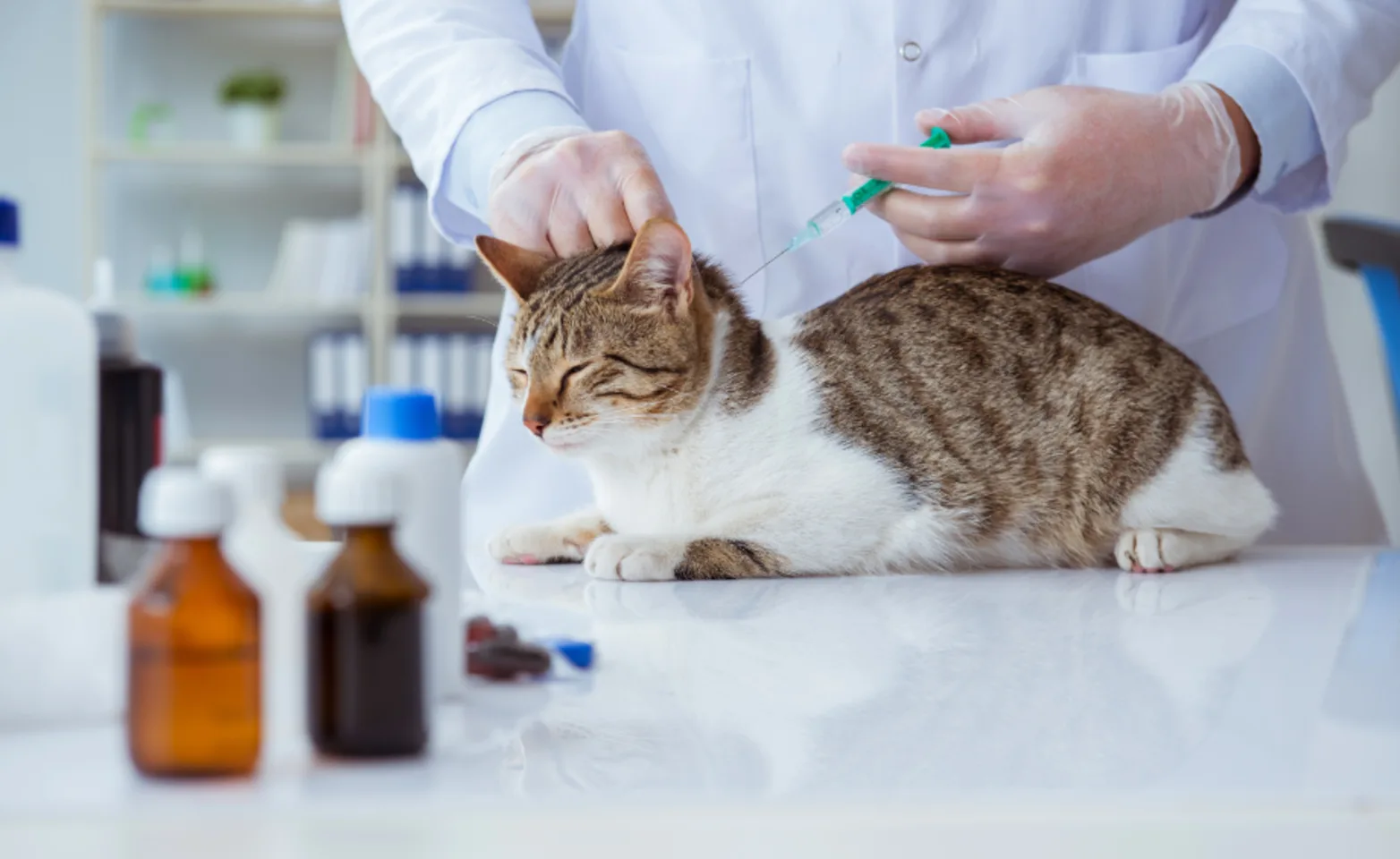Small Animal Hospital
Deciding which vaccines your cat should receive requires that you have a complete understanding of the benefits and risks of the procedure. For this reason, it is important that you discuss vaccination with your veterinarian so she can help decide which vaccines are most appropriate. Be sure to inform your veterinarian of your cat’s lifestyle, environment, medical history, current medical problems, and medications your cat may be receiving

Why does my cat need to be vaccinated?
The immune system plays a pivotal role in maintaining your cat’s health. One of the most important functions of this complex system of specialized cells and molecules is to protect cats from disease and infection caused by viruses, bacteria, and a host of other microbes and parasites. When a vaccine is administered, the immune system mounts a protective response. Then if your cat is subsequently exposed to the disease-causing organism, its immune system is prepared to either prevent infection or reduce the severity of disease.
Why do kittens require a series of vaccinations?
During the first few hours after birth, kittens ingest maternal antibodies contained in their mother’s milk. These antibodies help protect the kitten from infectious diseases until its own immune system is more mature.
Unfortunately, maternal antibodies also interfere with a vaccine’s ability to stimulate the kitten’s immune system. To counteract this problem, veterinarians often administer a series of vaccines, usually beginning when the kitten is around six to eight weeks of age. Vaccination is then repeated at three- or four- week intervals until maternal antibody has waned and the kittens own immune system is competent.
Are vaccines dangerous?
Not usually. But with any medical procedure, there is a small chance that reactions may develop as a result of vaccination. To maximize the benefits of vaccination while minimizing the risks, it is important to vaccinate only against infectious agents to which your cat has a realistic risk of exposure, infection, and subsequent development of disease.
Reactions may be mild or (very rarely) severe.
Mild Reactions:
The following reactions are fairly common and usually start within hours to several days after vaccination. They typically last no more than a few days.
Discomfort at the site where the vaccine was given
Mild fever
Diminished appetite and activity
Sore joints and lameness following calicivirus vaccination
Development of a small, firm, painless swelling under the skin at the site where the vaccine was given. The swelling usually goes away from several weeks, but if swelling persists or enlarges, call our office.
Vomiting
Serious Reactions
These reactions occur very rarely:
A serious and potentially life-threatening allergic reaction within several minutes to an hour after vaccination
A tumor called a sarcoma developing at the vaccine site several weeks, months, or even longer following vaccination
What should I do if I think my cat is having a reaction to a vaccine?
By all means, call us or an emergency center if we are not available. Even though vaccine-related disease is uncommon, the consequences can be serious.
What vaccines are currently available for my cat?
Panleukopenia: Feline panleukopenia (also called feline distemper) is highly contagious and a deadly viral disease. Extreme lethargy, loss of appetite, fever, vomiting, and diarrhea are frequently seen.
Until recent years, panleukopenia was the most serious infectious disease of cats, killing thousands every year. Thanks to the highly effective vaccines currently available, panleukopenia is now considered an uncommon disease. Immunity induced by panleukopenia is excellent, and most vaccinated cats are completely protected from infection and disease. Vaccination is recommended for all cats as this hardy virus does not require cats to cat contact.
Feline Herpesvirus and Calicivirus Feline: Feline herpes virus (the cause of feline viral rhinotracheitis) and Calicivirus are estimated to be responsible for 80-90 percent of infectious feline upper respiratory tract diseases. Sneezing, runny eyes, nose, fever, are symptoms of these agents. Cats become infected by direct exposure to infected individual; either from sneezed droplets, or from contaminated objects such as food and water dishes.
Most cats are exposed to these viruses at some time during their lives. Once infected, many cats never completely rid themselves of viruses. Protection induced by available vaccines minimizes the severity of disease, but does not prevent disease in all cats. Nonetheless, vaccination is recommended for all cats.
Rabies: Rabies is routinely fatal and is a major public health concern. Because of the potential for human exposure, rabies vaccination is required by law for all cats in our state.
Feline Leukemia Virus: Feline leukemia virus (FeLV) is the leading viral killer of cats. The virus is spread in saliva and nasal secretions of infected cats through prolonged contact or infected cat bite wounds, and from an infected mother cat to her kittens. Vaccination against FeLV is recommended for cats at risk of exposure, especially those younger than four months of age.
Chlamydiosis, Feline Infectious Peritonitis, Feline Immunodeficiency Virus, and Bordetellosis: The use and efficacy of these vaccines is controversial and in many cases the risks outweigh the benefits. We do not recommend these vaccines for the majority of our patients.
